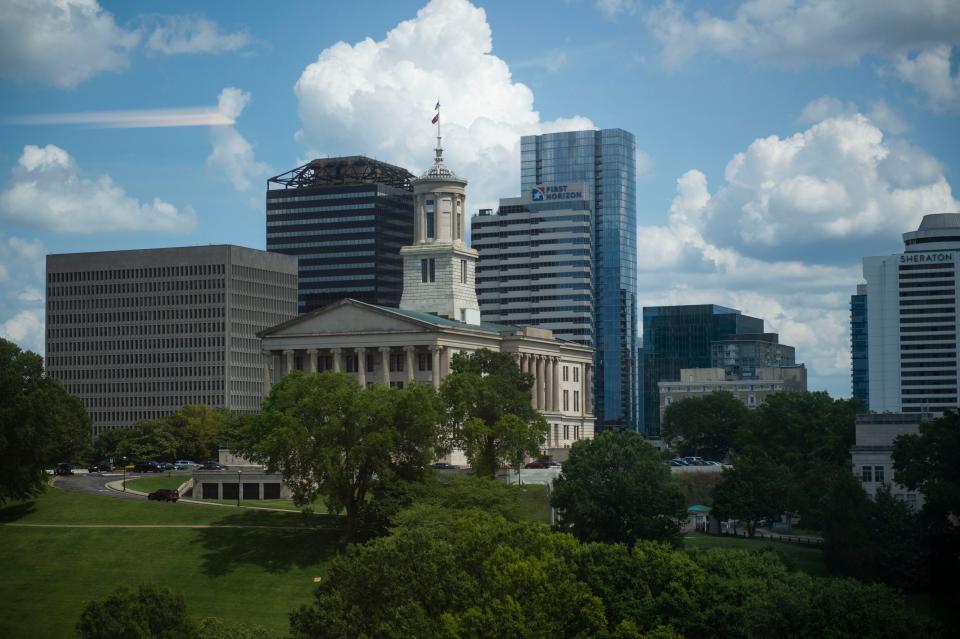Can Nashville's next mayor mend relations with the state? How candidates would squash feud
- Oops!Something went wrong.Please try again later.
It's only four tenths of a mile, but the chasm between Nashville’s Metro Courthouse and the Tennessee State Capitol may as well be 100 miles wide.
It’s a rift the city’s next mayor will have to bridge.
Whether the conflict started with eroding relationships through three mayoral transitions in five years, or with a Metro Council vote killing Nashville’s bid to host the 2024 Republican National Convention, city-state tensions have never been so high.
Conflict culminated this spring with an onslaught of legislation stifling Nashville’s self-governance: a bill to slash Metro Council seats by half, and a slew of bills to dissolve the city’s most powerful governing boards and put appointing power in the hands of state officials.
Repairing the breach is critical: Without the state’s permission, the city’s hands are tied. From regulating party buses and Airbnbs to securing essential funding for transportation projects, most changes require authorization or support from the state.
“I do think people probably miss how much we at the state work on the in-the-weeds details of local government,” says state Sen. Jeff Yarbro, D-Nashville. “Most of the things that we actually think of as local issues start in the state government.”
While every candidate agrees that shifting the axis of control homeward is a high priority, few have specific plans for how to do it — and fewer have records of success with the GOP-controlled state government.

A problem of the city’s own making?
Most candidates identify specific events as turning points in the escalation.
Alice Rolli sees state Comptroller Justin Wilson’s threat to take over the city’s finance in 2019 as the first spark.
Matt Wiltshire blames the breakdown of relationships between city and state officials during the city’s recent administration changes. He says that hasn’t happened with Memphis because Mayor Jim Strickland has diligently maintained relationships with state leaders.
“I don't think that there are many people in the state who are super passionate about reducing the size of the Metro Council from 40 to 20,” Wiltshire says.
But the tipping point, many agree, was the Metro Council’s vote in 2022 to quash Nashville’s strong chance of hosting the Republican National Convention.
“We voted against our own interests,” Nashville Property Assessor Vivian Willhoite says, arguing that the convention would have brought a lot of business to the city — and is now the reason why Nashville is being punished by the state.
“You can't be a city that welcomes everybody except the people who disagree with you,” Yarbro agrees. “I think the RNC vote made it personal to some of the legislators.”
‘A totalitarian state’
Candidates don’t mince words expressing disapproval for Tennessee’s conservative governor and Republican supermajority legislature, though many believe that Gov. Bill Lee and the GOP leadership are trying to do what they feel is right.
Yarbro describes the current climate as “one of the most politically treacherous environments imaginable.”
Councilmember Freddie O’Connell says the legislature “has moved to a place where they see punishment of Nashville as nearly a sport.”
Councilmember Sharon Hurt calls Lee and the Republican supermajority “autocratic and opinionated.”
State Sen. Heidi Campbell, D-Nashville, calls it “a totalitarian state,” citing abortion bans with extremely narrow exceptions and laws that single out Tennessee’s transgender community.
“I don't think it's too extreme to say that kind of a thing where we're banning books and we're telling people that they can't teach what really happened in history as totalitarian,” Campbell says. “I think it is.”
Former AllianceBernstein chief operating officer Jim Gingrich, a political outsider, criticizes politicians on both sides for “trying to score points rather than actually do what's right for the people.”
Coalitions will be key
Building a regional coalition of mayors and local officials with common ground will be foundational to changing Nashville’s power dynamic with the state, candidates agree. But some are more experienced than others in doing so.
During his nine years representing Nashville in the Senate, Yarbro says he’s learned that building agreement between coalitions within the city itself is critical in passing laws granting state permission needed to allow Nashville to vote on policy change.
“When that happens, we are almost unstoppable, but when we are fractured, they pick us apart,” he says. “A lot of times the state's not so much picking on Nashville as picking sides within Nashville.”
Yarbro says his personal experience working with existing coalitions and ability to find common ground among them sets him apart.
“It doesn’t matter if you have the best ideas if the state legislature is going to preempt them next week,” he says. “It doesn’t matter how good your transit plan is if the state doesn’t let you do it, and if your Congressional delegation isn’t helping you fund it.”
Wiltshire says effective coalition building with businesses could also keep Nashville’s interests in the forefront of lawmakers’ minds.
“I think it's important for the mayor also to work with business interests, who probably do have some influence with certain legislators, and say to them, 'Look, what you guys are doing is kind of messing stuff up. Don't mess stuff up,’” Wiltshire says.
Some candidates are already laying the foundation. As a councilmember, O’Connell has been proactive in building communication channels with the highest level state officials.
“I went personally, not to drive an agenda or do anything other than introduce myself and at least open a channel of communication with Speaker Sexton and Lt. Gov. McNally these last few years,” O’Connell says.
Rolli says she has already met with surrounding county mayors to discuss regional approaches to transportation and waste management. She also touts personal friendships with several lawmakers and state officials, from her experience in the Department of Economic and Community Development.
Campbell says she will work to build cooperation and communication between the city and rural mayors, and Republican mayors in surrounding counties.
Several candidates can point to their experiences in regional leadership: Campbell served on the regional mayor's caucus as mayor of Oak Hill, and O’Connell served on the board of Cumberland Region Tomorrow, as well as the Nashville transit authority board.
What will they work to change?
Nashville’s goal in restoring its relationship with the state, candidates agree, is to reclaim autonomy.
“They should stop trying to run our city government and allow us to run our own city,” Hurt says. “I also think that they need to eliminate these anti-LGBTQ bills. I think that they should allow women's rights to be women's rights.”
Wilhoite wants the state to reverse its policies on state appointments for the airport and sports authorities.
“It was established that it will be local control, and that's what people wanted, and that's what that should be,” Wilhoite says.
Others will work to empower Nashville to embrace the future. O’Connell and Rolli both want Nashville to be able to levy impact fees — one-time user fees on new development charged to developers — to help the city pay for infrastructure and services associated with growth. Many areas surrounding Nashville, including Williamson County, Brentwood, Franklin, Rutherford County and Smyrna already collect impact fees, but the state has oversight of their implementation.
“Impact fees would let us be able to allow development to help pay for the infrastructure burden that a lot of the development puts on an area,” O’Connell says.
Rolli also sees impact fees as critical to solving Nashville’s transit and growth challenges, saying they “allow cities to capture the cost of growth at the site of growth.”
“We are putting Davidson County taxpayers at a disadvantage relative to every other one of the top 25 metros in the country,” Rolli says.
Gingrich wants the state to invest more of Davidson County’s state tax revenue back into the county.
“We all know that Nashville — Davidson County — contributes a lot more in tax revenue than it gets back in dollars from the state,” Gingrich says. “It's not just that I want the legislature to stop doing bad things. Ultimately, it's like how do I bring more of those state dollars to Davidson County?”

Who has the most experience working with the state?
A mayor with some experience working with the state could be a boon to the city. While all have interacted with state officials on some level, a few stand out from the pack.
As Metro Council members, O’Connell, Hurt and Willhoite have all worked on coalitions and had conversations with state officials to lobby for policy changes.
O’Connell worked with the late Rep. Bill Beck to figure out the parking scenario around the new State Museum and Nashville Farmers' Market, and worked with Yarbro to seek authority from the state for local regulation of party buses.
Wilhoite worked with Rep. Harold Love on a measure to allow Metro to raise the income cap on property tax freezes from $42,000 to $60,000, which Metro approved this year.
Rolli is the only candidate who has worked within the state’s executive branch, as a deputy commissioner in the Haslam administration.
“It is saying I need you and I need to work with you, and I need your help to pay for things that we need to get done in the city,” she says. “I don't see them as this, like, evil force.”
Meanwhile, Gingrich touts his ability to make new friends.
“I have never found that any legislator — even ones that I may disagree with on a series of issues — is not open to a conversation,” he says.
As a nine-year veteran lawmaker, Yarbro has the most experience sponsoring legislation, building coalitions and negotiating passage through the supermajority of any candidate by far — and a formidable list of wins achieved for the city.
Yarbro sponsored the bills that authorized Metro to regulate party buses downtown, to tax beer sold on Broadway to pay for safety and maintenance downtown, to use fees collected from solid waste toward recycling and reclamation efforts, and to issue bonds to build new affordable housing. This year, Yarbro successfully sponsored a bill to streamline electrical codes inspections to help bring wait times down. He has also been a key voice in securing state funding for developments on the East Bank, and sponsored legislation to prevent Nashville property taxes from being used toward the new Titans stadium, shifting that cost to tourists and new development.
Campbell, who is Yarbro’s colleague in the Senate Democratic Caucus, calls him “an excellent legislator,” but says her team building, communication, positivity and listening skills set her apart.
Since her election in 2020, the freshman senator has passed bills to preserve 20,000 acres of hardwood forest, promote conservation of the Duck River, and require high schools to provide voter registration information to seniors, among others.
Yarbro argues that nearly a decade of experience has taught him the hard reality of standing up for Nashville when it counts.
“I think that you should not be spoiling for a fight… but you can’t just go along to get along,” he says. “I have represented the city long enough to understand where it is expected, and where it is appropriate, and where it is morally required to stand up and be counted — even if you lose, or even if it hurts something else that you care about.”
Reach reporter Vivian Jones at vjones@tennessean.com.
This article originally appeared on Nashville Tennessean: How Nashville mayoral candidates plan to squash city's feud with TN
